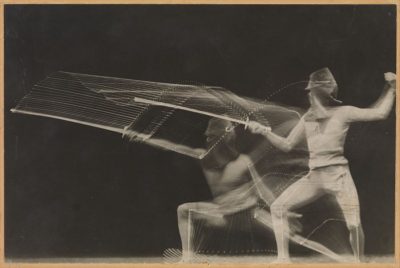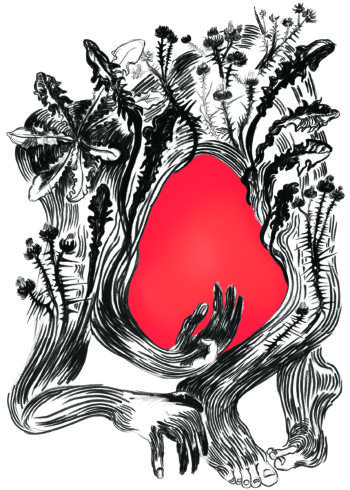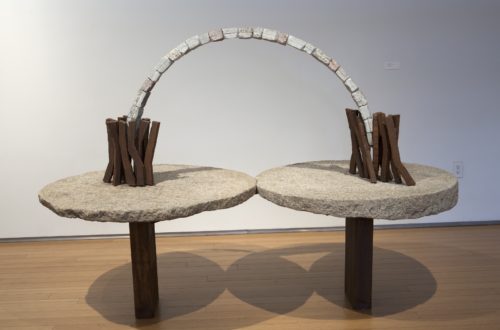
“By Bread Alone” by Danny Bellinger (wil’um)
When I was a young boy I learned that you could shoot a man for disrespecting your sister, even if he was her husband and your brother in law. All you had to do was trick your kids into believing the weapon was a cap gun by putting caps in the hammer, before you fired into the night air at the man who’d limp for the rest of his life for reasons unbeknown to me. That’s what my father did. My brother tells me years later that the fake cap gun is the reason why my uncle limps like he does. I’m putting two and two together and know now that my uncle was the man who ran into the invisible night to never reappear when daddy started shooting his cap gun. My father would spend years chasing the demons from his past in Holly Hill, South Carolina before settling down to raise a family in what was then called the Black Grove, now West Grove.
The Black Grove was where I grew up. It was a place where black people had our own nursery and schools. Across the street from our duplex apartment complex Kingsway Apartments, was St. Albans Day Nursery, which was adjacent to Tucker Elementary School. But it wasn’t the place we went to school. Down the block in the other direction was George Washington Carver Elementary, Junior High, and High School. The school was named after the man who had transformed peanuts into peanut butter fame. Another one of the other black high schools in Overtown, Miami was Booker T. Washington Senior High, a rival to Carver. Both schools were given the names of black men who were educated but pragmatic, like many of the black middle-class and working-class men in The Grove. Many of the black men in my neighborhood made their living with their hands and put their kids through college that way. They were carpenters, plumbers, mechanics, electricians, landscapers, and roofers or construction workers.
When my father quit his construction job with Rocky, the white man or Construction Company he cursed each day while entering the house, he started his own landscaping business. He made it to the city of Miami in 50’s with the hope of leaving behind the demons that hounded black men during those days in the South, the demons that told him he wasn’t a man, or a human being for that matter. He, like his older brother Earlington Leroy, left Holly Hill, South Carolina and came to Miami as a way to escape the ugly racism they had experienced growing up as kids. I don’t even know how he made a living and raised family with an eighth education. They lived on the property of a white man whose land they sharecropped and whose house was rented to them until after my grandfather died. When their father died my grandmother was told she had to leave the property unless her boys could replace the work her husband. Her boys, my father and his brothers had no choice but to work the land so that their family could have a place to live and food to eat. So, my father had to leave school to work the fields. Years later when my uncle Leroy saved up enough money to buy his own car, he decided to leave Holly Hill and my father pleaded to take him along, but the experience in Holly Hill had already left its ugly scars on him.
The old man was a country boy, so it wasn’t first time he’d pulled a trigger of a gun; but last time he’d done it the family’s life, and certainly mine, had changed forever. Forever is not a word to be playing with, not one to be throwing around like a football on a park. But when the old man decided to take matters into his own hands one fateful evening, forever became a word fitting for the moment that was to come.
What’s it like to live with a man who’s killed a man, not as a casualty of war, or as a black man by rope, but as a daddy whose pride is shattered when a man pulls a gun on him in front of his two oldest boys. What’s it like when he stands with his hands, touchdown high, choking a deer rifle that hunted down a man in second degree. When he left the house he smelled like Smirnoff, gasoline, fresh cut grass, and momma’s fried chicken, when he drove the blue Ford pickup to the murder scene and to jail.
Daddy was a man who revved car engines on the weekend, the man who I watched stash a gun in the trash can and hurry in the house while looking out screen door into the eyes of trouble; the same man who once staggered home bloody in a white t-shirt slashed to pieces by our one-time barber who he’d gotten into a fight with. He was the man who got drunk as Cooter Brown on Friday nights, the man who played cards with crazy uncles who cussed each other with razor blade precision. He was the man who left early mornings for work and said about as much as men might on a country western, or the Pink Panther in the cartoon we’d watch together Sundays after Sunday school. My daddy never stepped foot in a church, played guitar the blues key of bassie boo, and never drank or mouthed a profane word on Sunday. Sundays was also one of the few times we’d get a laugh out of him. Some Sundays while watching a western I felt brave enough to ask him for a quarter to buy ice cream from the Ice Cream Man.
My father has never watched a football game on television and has no interest in the game beyond his son. Not me, but his second son who he admonishes and punishes with tough love, often. He’s coming up the street and everybody in eye sight of him knows it’s him, and the message of his arrival beats him to Carver Park where his second son is playing on the 95-pound Optimist Club football team. My best friend’s old man is the coach, and he has my brother on the bench. He’s really standing on the sideline, but it’s the bench in my neighborhood, where the expectation is that you’ll be a great football legend in this community even if you don’t make it pro. My father has made it to the park dressed in a white v neck t-shirt, short pants cut from a pair of polyester slacks he doesn’t wear anymore, nylon socks that come up to the top of his calves, and a pair of church shoes.
He’s not smiling when he arrives and goes over to his boy and asks him why he’s not in the game. He’s interrupting the sidelines, but he has no idea that he is. He’s just trying to understand why his boy is not in the game. In his mind, he must be scared to play, but he knows he didn’t raise him to fear any damned person or thing in life. The coach catches wind of the commotion and goes over to the o man and politely yells at him to get off the sideline and out of the way. But my father can’t believe he’s hearing some man with an opinion about him talking to his own damned son. And he responds by getting into the face of the coach and says, “This is my goddamned son. Mind your fucking business.” The coach is a little confused but figures out from those around him that the boy is his son, and so responds that “I’m the coach goddammit, and I’ll play him when I’m ready.” The old man (my father) who has no concept of how this game is played, has figured out that his son is not playing because this son-of-a-bitch is pulling the strings. So, he looks at my brother and tells him to take off his uniform right there on the sideline, but underneath the uniform he’s in nothing but his underwear. The o man doesn’t care, and my brother shamefully walks home in his underwear, and he never plays another down of football until he gets to high school.
The old man had finally left his roofing job with Rocky, the company or the man or both, he cursed like hell when he walked through the door of the house venting to my mother. He was now working on his own as a lawn man and had talked himself into a city contract to cut a lot in the Grove not far from where we lived, and just across the street from Carver Elementary School where the hippies in flower colored Volkswagen vans used to greed us kids coming into the school from entrance facing Grand Avenue. I can hear The Youngbloods’ song Get Together, one of the many songs that played from the soundtrack of my life from speakers in the sky.
My mother is on one of the second or third grade pictures as a parent support person because she was a stay at home mom in those days. My father brought home the bacon from the roofing job he hated, but my mother tells me he was making good money for a young black man. She was also a diminutive 4’ 9” petite woman then who always kept herself dressed well and her hair looking good and kept my brothers and I nicely dressed in matching outfits according to age, in clothing from Burdines and JC Penny in the newly integrated Coral Gables. Sometimes my youngest brother and I would go with her and hide in the clothes and get the coldest look, as she clinched her teeth and lips together and got close to us as she whispered admonishing words that would send a chill through the spine of Satan himself. In her mind, you had to act like you had some sense around these white folks, because they already had their preconceived notions about who we were.
But my mother spent our money wisely and was given all the money my father brought home at the end of the week. She was saving up for a house in South Miami like many of her friends who lived in the two-bedroom, one bath, Kingsway Apartments that was nestled in between Tucker Elementary School and what was once George Washington Carver High School. Surrounding the apartments that ran a few blocks long were the houses of middle-class black folk who seemed to always be actively involved in neighborhood politics on behalf of the community. She spent two years in college studying to be nurse in the first program in Miami designed for women of color, but she quit just before she received her certification so that she could raise a family. I recall her saying how the o man complained bitterly about her being gone when she needed to be at home raising the boys he’d shot into her.
In 1976 I was quite the bullet myself then, twelve years old and would be thirteen four days before Christmas, and I was lucky you might say, to be getting both birthday and Christmas gifts at the same time. I’m looking at black and white pictures of my brothers and me sitting with the old man who is proud of this moment and wants this Christmas day picture taken of him and his boys to reflect it. My youngest brother and I are sporting cowboy hats and holsters and holding up our cap guns, but guns none-the-less, just like they did on the western television shows Bonanza, The Lone Ranger, The Wild, Wild West, Gunsmoke, and so many others the o man loved watching late Sunday mornings, while my mother and us boys got ready for Sunday School and church. His contribution to our Sunday morning ritual was cutting our hair so low until you could barely see the hairline on our heads.
I remember the day it happened. My mother was in the kitchen cooking the day my father took that deer rifle down from the shelf of the closet of his room where it rested out of harm’s way of me and my brothers who were not quite tall enough to reach it without a chair. The barrel lay open and the red casing buck shots with ends of gold are in the box somewhere next to it. She was cooking fried chicken and talking to herself like she always did now, talking things out in her mind. I was in the living room watching television, but I was always preoccupied with what was going on with her. I could smell the Smirnoff, his favorite vodka, the thing that made him edgy and more courageous than he would be otherwise, as if he needed it to be.
I heard sirens in the distance, all racing in the same direction loudly, then fading. I told my mother I was going down to the park near the lot where the o man was confronted, the place that drove him home to take a swig of Satan’s Smirnoff and pull down the deer rifle and buck shots that never left the top shelf of the closet in his room. My mother shirked it off like he was being “William,” trash talking whenever he’d had a taste of the devil’s juice. She told me not to go cross Grand Avenue to the lot where the incident had supposedly happened. I agreed that I wouldn’t and jokingly told said I’d give her the scoop when I’d returned. But something told me that this time was different and maybe she knew it was.
As I grew closer to the park I could hear the sirens more vividly and my heart began to race the bullets that shot in my head. The close I got more pronounced the sirens and the lights, and the crowd that seemed to be gathering. Finally, I was close enough to the gate to look hard in the direction of the lot, and then out of nowhere a boy from the neighborhood raced past me as I mustered the courage to draw near the sirens, ambulance, and cop car lights across the street. But I don’t go across the street. When the boy I know races past me, he stops on the dime and turns sharply in my direction to tell me the good news, or the news, the gossip really, until he realizes I’m not just a boy from the neighborhood he can mouth the news off to. He realizes that I’m the son of the man who he is delivering the news about. “Your daddy just killed a man” he says, and he runs off like he’s on the Pony Express. At that very moment I was feeling proud and scared all in one, as I looked on from the fence of the George Washington Carver Elementary School playground I’m holding for security, the same fence that was also connected to Carver Park’s Recreation Center that kept the kids in our neighborhood out of the mean streets of Coconut Grove, and closer to home.
My daddy had done it, I thought to myself. In some crazy twisted way, I believed he was a man’s man at that very moment, and I had grown an inch taller in courage, and my life would now be changed forever. I knew then, at that very moment, that I was now the boss of me and not the boy of every crazy nigger who ever tried to take something valuable from me; I was the boss of every Saturday night dance in the junior high gymnasium that ended in an abrupt gun fight; I was the boss of every moment when another project neighborhood shorty showed me his gun and his snarl because I was skinny and small and still looked out of place even with my hat kicked to the side and newly minted jail house tattoo on my arm. I also knew at that very moment that the electric football set I wanted for Christmas would not be mine, not this Christmas, four days after my 13th birthday.
Being and pretending are two different things that you learn from watching television or a movie. In the Black Exploitation movies, the gangsters, bad assess, or crime fighters had titles named after them like Super fly, Shaft, or Cleopatra Jones, and they were stars who got a chance to live to see another day. Even jail time was a momentary scene that probably lasted all a few minutes at best. So, I wasn’t ready for visitation day to see the old man in his orange uniform through a glass thicker than the kind you see at gas stations in the hood. And no one was going to run in and try to shoot through the glass at the son of a bitch that pissed him off, because his brand of smokes cost more today than they did a week ago. You were searched before you came in here, and the steel doors that trailed you like armed guards, would surely shut you in for an ass whooping you wouldn’t soon forget.
There he was on the other side of the glass. I didn’t know what to make of it. He put on a good face for my mother and us, and we tried to look enthusiastic about seeing him like this. It seemed like we had all lost the words to ask the questions we really wanted answers to. Like, how is it really? Are you fighting for your life every day? Do people really take your food if you’re the new guy? Will they really fuck you in the ass if you drop the soap in the shower? But momma was with us, and he was never the kind of man we’d ask questions like that anyway.
Years later on the 4th of July, bullets grazed the hot summer air from all the guns being shot on the porch steps of men and young men whose dreams had been cashed in and paid forward on a younger sibling. It was my turn to shoot my brother’s gun, to grab the handle of the large canon sounding 38 magnum and blast the god damn sky into Yosemite Sam smithereens. But all I kept thinking about was the day that boy told me my daddy had killed a man. No, what I was really thinking about was the first day of 7th grade when I was approached by this girl named Cookie who wanted to show me something. I followed reluctantly like a boy who had his own mind and not like the curious and timid I really was. Through the first day of school crowed she walked me through the maze of kids to another boy who was now facing me, and said to us both, “this is the boy whose daddy killed your daddy.”
I didn’t hold the gun in my hand and let it get to know me like a big brother or a crazy uncle looking out for me on my way to the store. Something inside me refused to hold it so that it might get to know me like a father would a son. Instead, I grew closer to the old woman next door who dipped snuff Ms. Duehart, who after dipping would spit it in our yard, the same woman who also grew cotton and red pepper in the city. The same old woman whose sanctified eyes glazed over and hypnotized me into submission to sit and talk with her a while in the evenings. That was around the time I put a bible in my hand. As much as I had wanted more in life, just like my old man, I knew something was missing, something important, and that something inside of me knew that a man can’t live by bread alone.
*
Danny Bellinger (wil’um) grew up in Miami, Florida, and received his M.F.A. in Poetry from Goddard College. He writes poetry, fiction, and nonfiction, and has been published in Black Renaissance Noire, The Wandering Hermit Review, Borderlands Texas Poetry Review, and a few others.




